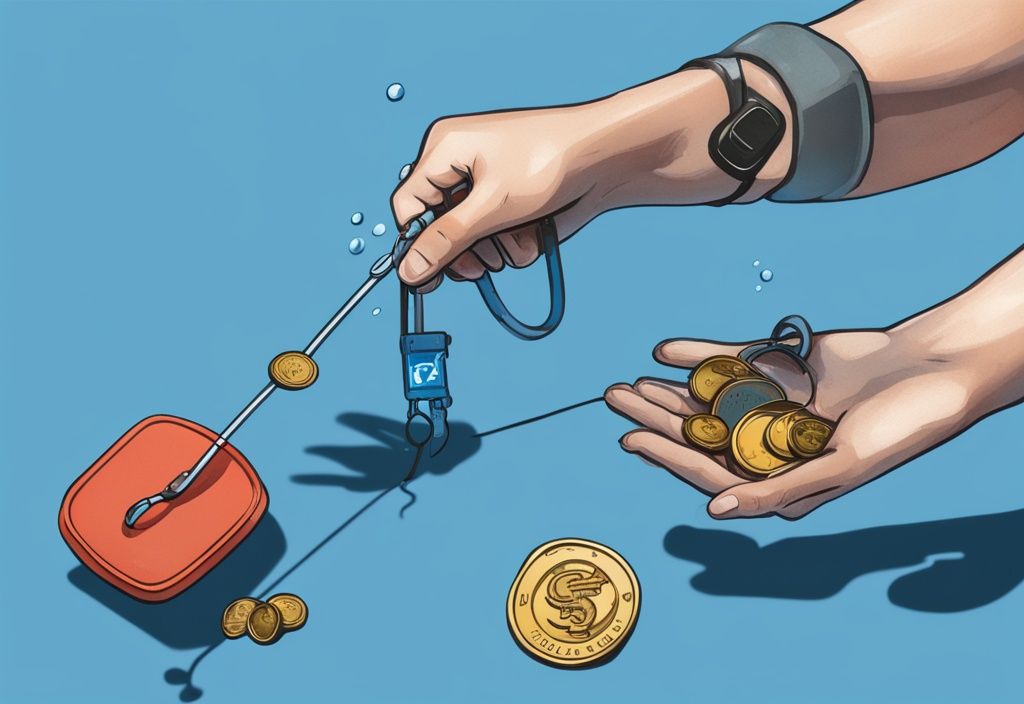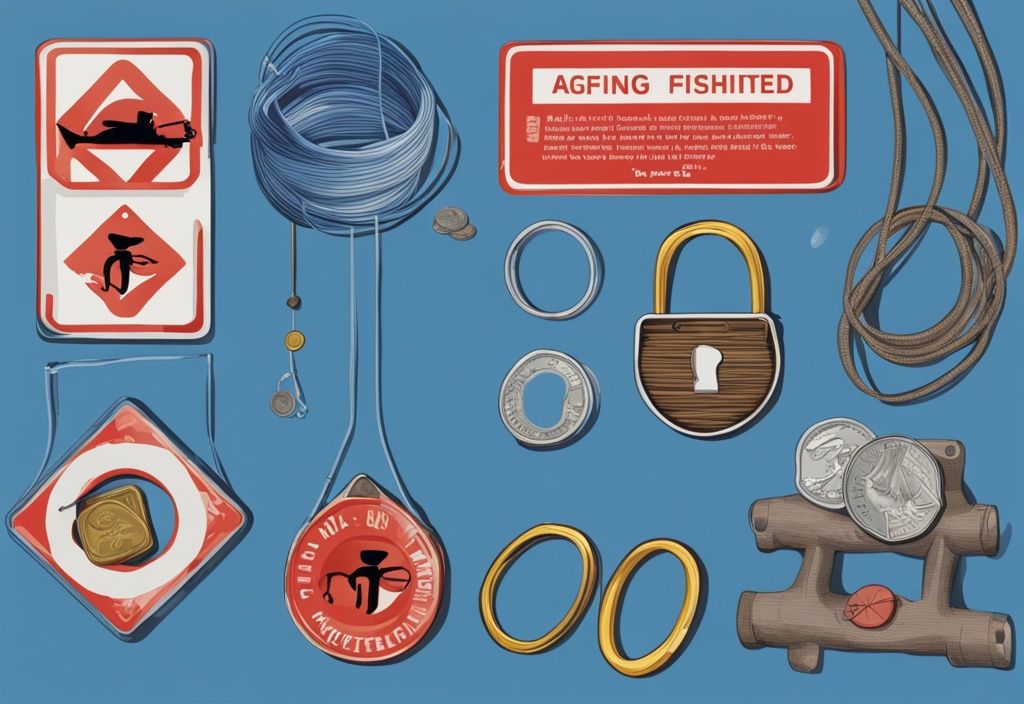Who’d have thought magnet fishing could land you in hot water? No pun intended! As a seasoned angler swapping my traditional fishing line for a magnet was an exhilarating change. But the shocker? It’s not always legal. Let’s delve into why magnet fishing is illegal in some places.
Strike your curiosity, hasn’t it? From preserving historical items to issues with public safety, there’s a pack of reasons mixed into the stew of rules and regulations. This ain’t your everyday fishing adventure, folks. Grab a seat; we’re about to go treasure hunting beneath the surface of the laws.
Whether a magnet fishing rookie or a dab hand with a rope and carabiner, this info is key. After all, who wants their exciting hunt for submerged ‘riches’ clouded with legal mishaps? Stick around as we navigate these waters together, responsibly.
The Concept of Magnet Fishing
Magnet fishing is a fascinating hobby, blending history, treasure, and the nostalgia for things long lost. This section dives into its essence and explains why this seemingly harmless activity could be illegal in some areas.
What Is Magnet Fishing?
Magnet fishing is an exhilarating activity where you use powerful magnets to discover and retrieve metallic objects submerged in water. Enthusiasts typically attach these strong magnets to sturdy ropes, allowing them to ‘fish’ for items that may hold historical significance, monetary value, or sentimental meaning. Picture this: the suspense as you pull up your haul, the thrill of uncovering a piece of history or something unexpected. It’s like treasure hunting but with a modern twist, targeting specifically metal objects lurking beneath the water’s surface.
How Does Magnet Fishing Work?
The process is quite straightforward, yet undeniably thrilling. You start by securely tying a robust magnet to a length of rope and then casting it into a lake, river, or another water body. Once submerged, the magnet works its magic, attracting metallic objects lying on the bottom. Then comes the moment of truth – you pull the rope to bring the magnet, along with any attached items, back to the surface. It’s this blend of adventure and technique that makes magnet fishing so captivating. But you might be wondering why magnet fishing is illegal in some places. It often boils down to the disturbance and potential removal of historically significant artifacts, which preservation laws strive to protect. So, as you enjoy the thrill, it’s crucial to be aware of these regulations to avoid inadvertently violating local laws.
Legal Challenges of Magnet Fishing
The Role of Federal and State Laws
Removing historical or archaeological artifacts from state or federal waters without a permit is typically prohibited. This is a big reason behind the question: why is magnet fishing illegal in various regions. Federal laws such as the Archaeological Resources Protection Act (ARPA) emphasize preserving archaeological finds. Enforcing these laws ensures that underwater artifacts are studied and preserved in a controlled manner, often by professional archaeologists, protecting the integrity of our cultural heritage.
Archaeological Protections and Magnet Fishing
Protecting Our Cultural Heritage
Historical artifacts cover a wide range of items, often defined by their age—generally over 50 or 100 years old. Magnet fishing frequently intersects with historical sites, which can disturb archaeological sites or remove “objects of antiquity.” Both can violate state and federal regulations.
States protect artifacts related to many periods, including Native American history, European colonization, and early settlement periods. Preservation aims to maintain these culturally significant sites’ historical integrity, enabling controlled study and ensuring findings are placed within their proper context.
How Magnet Fishing Interacts with Historical Artifacts
Magnet fishing has the potential to disturb underwater environments, inadvertently harming protected archaeological sites. Items found during magnet fishing expeditions may legally belong to the local government in many jurisdictions, not to the finder. Despite magnet fishing not being universally banned, local and state laws often restrict the removal of historically significant items. For those interested in outdoor activities, learning how to tie line on a baitcaster can be a useful skill. This adds another layer to understanding why is magnet fishing illegal in certain areas, emphasizing the need to protect and preserve these artifacts responsibly.
State-Specific Restrictions on Magnet Fishing
Laws in South Carolina
South Carolina explicitly bans magnet fishing to prevent potential damage to archaeological sites and artifacts. Even where magnet fishing is allowed, a license is needed for such activities in state waters. This is a concrete example of why is magnet fishing illegal or restricted in certain locations to safeguard historical treasures.
Regulations in Indiana
Indiana permits magnet fishing on public waters, but with specific requirements: a Department of Natural Resources (DNR) property permit is necessary. Additionally, the magnet used must be hand-retrievable to minimize environmental damage. This regulated approach helps control the activity, balancing enthusiasts’ interests with cultural preservation.

Other States with Stringent Rules
Local ordinances in various states may impose additional restrictions, particularly in protected or high-risk areas. States have differing definitions and protections concerning historical artifact preservation, contributing to a complex legal landscape.
These varied regulations highlight why is magnet fishing illegal in certain circumstances, reinforcing the need for followers of this hobby to stay informed and compliant with local laws.
Risks and Safety Considerations in Magnet Fishing
Magnet fishing is an exhilarating hobby, but it comes with its own set of risks and safety considerations. Let’s dive into the potential physical dangers and the environmental and navigation hazards that enthusiasts must be aware of.
Potential Physical Dangers
Possible Injuries from Magnet Fishing
The thrill of discovering hidden treasures can be irresistible, but it’s crucial to be mindful of the physical risks. Those powerful magnets? They can be your worst nightmare if mishandled, causing serious injuries like crushed fingers or severe bruising. Imagine lifting a heavy, submerged object from an awkward angle—it’s like trying to lift weights without proper form. You’re looking at potential back injuries or muscle strains. Proper ergonomics and a cautious approach can really save you from a lot of pain.
Risks of Retrieving Hazardous Items
Finding a relic or lost item is exhilarating, but underwater hazards lurk where you least expect them. Sharp debris like rusted metal fragments can cause nasty cuts or punctures. And let’s not even talk about the possibility of pulling up dangerous items like discarded weapons or unexploded ordnance. Handling these isn’t just risky—it can expose you to harmful substances like toxins or tetanus. Always equip yourself with protective gear and stay alert to what you’re bringing to the surface.
Environmental and Navigation Hazards
Magnet fishing often raises questions about its legality, especially considering the potential environmental and navigation hazards it introduces. Imagine retrieving intriguing objects all day only to discard them improperly. These items can become obstructions, posing risks for boaters, swimmers, or even wildlife. Moreover, the act of trawling magnets along the bottom can disturb sediment layers, harm aquatic plants, and disrupt the homes of small aquatic creatures. So, the impact is far-reaching—from disturbing natural habitats to creating ecological imbalances.
Why is magnet fishing illegal? The answer lies in these potential harms. The disturbance and damage to underwater archaeological sites, the environmental repercussions, and the physical risks underscore the need for strict regulations. Following legal guidelines and practicing responsible magnet fishing aren’t just legal requirements—they’re vital for preserving our cultural heritage and natural ecosystems.
So, the next time you’re out on the water, remember that magnet fishing is not just about the thrill. It’s about respecting the environment and ensuring the safety of yourself and others. Happy fishing, and always stay mindful!
Legal Consequences of Illegal Magnet Fishing
Magnet fishing might sound like an exciting hobby, but it’s got some serious legal strings attached.
Let’s dive into the nitty-gritty of what you could be up against if you find yourself on the wrong side of the law.
Fines, Penalties, and Criminal Charges
Magnet fishing can sometimes land you in hot water, especially when it involves bringing up historical or archaeological artifacts. Laws protecting these treasures are as strict as a tight line on a big catch because of their immense cultural and historical value. Breaking these laws can lead to hefty fines or even criminal charges. Imagine reeling in not just artifacts but also a mountain of legal trouble! These strict measures ensure that our cultural heritage stays intact and out of the wrong hands.
Confiscation of Found Items
Found something remarkable? Authorities might step in and confiscate items, especially those with historical significance or considerable value. Hanging onto these treasures, even unknowingly, can tangle you up in more legal issues. This is because many artifacts are legally the property of local governments or are protected by state or federal laws. Properly reporting and handling these findings is crucial. It’s like ensuring that a prized fish gets the rightful honor it deserves rather than ending up on someone’s wall trophy.

How to Report Dangerous Finds?
Stumbling upon dangerous items, like old weapons or unexploded ordnance, while magnet fishing is a real possibility. If you ever reel in something risky, it’s critical to report it to local authorities immediately. The police strongly advise against handling such finds yourself—these items can be as unpredictable as a catfish in a hurricane. Let the professionals take over to prevent any harm to yourself or others. This ensures the safe disposal of dangerous items and keeps you in line with legal requirements.
Guidelines for Legal Magnet Fishing
How to Obtain Necessary Permits?
Engaging in legal magnet fishing often necessitates securing specific permits from local or state authorities. The permitting process varies depending on the region, so it’s crucial to research the requirements thoroughly. This typically involves submitting applications and potentially paying fees to obtain the necessary authorizations. Without these permits, you risk facing legal penalties. To avoid any misunderstandings, coordinate with the appropriate wildlife and environmental agencies to ensure compliance.
It’s essential to follow all local, state, and federal laws. Different jurisdictions have varying regulations aimed at protecting historical sites, minimizing environmental impact, and ensuring public safety. Ignoring these laws can lead to legal repercussions, including fines and criminal charges. Understanding why magnet fishing is illegal in some areas helps appreciate the importance of obtaining the necessary permits and following regulations.
Respecting Property Rights in Magnet Fishing
When it comes to magnet fishing, respecting property rights is crucial. Trespassing on private property can lead to significant legal issues, including charges of criminal trespass and fines. Always seek explicit permission from landowners before attempting any magnet fishing activities on private lands. This not only avoids legal challenges but also fosters good relationships with property owners.
Understanding property boundaries is equally important. Using tools such as maps or property records can help in identifying where public land ends and private property begins. Adhering to property lines ensures you remain on legally permissible grounds, which is paramount for lawful magnet fishing. Knowing why magnet fishing is illegal in private areas reinforces the importance of respecting property rights.
Reporting and Handling Potential Historical Artifacts
If you come across significant historical artifacts during magnet fishing, it’s essential to report and handle them appropriately. Contacting historical preservation organizations, such as local historical societies or state archaeology offices, ensures that artifacts are preserved and studied in a professional manner. These organizations can provide guidance on how to best protect and document any findings.
Properly reporting artifacts helps preserve cultural heritage and prevents potential legal issues. In many jurisdictions, historical artifacts found are not the property of the finder but belong to the local or state government. Keeping these artifacts without reporting them can lead to severe legal consequences. Understanding why magnet fishing is illegal in sensitive areas underscores the importance of responsible reporting and handling of historical finds.
International Regulations on Magnet Fishing
Magnet fishing has sparked a lot of debate and curiosity worldwide. While it might seem like a quirky way to spend an afternoon, different countries have varied laws reflecting their unique historical and environmental concerns. Let’s take a closer look at why magnet fishing is illegal or tightly regulated in some places.
Laws in the United Kingdom
Magnet fishing in the United Kingdom falls under strict regulations primarily enforced by the Canal and River Trust. The main reason it’s often illegal here is to prevent the removal of materials from canals, which is strictly prohibited. Imagine yanking out an ancient artifact—with good intentions, but causing a historical loss. Violating these regulations can lead to some hefty fines. However, there are exceptions. Some areas might have local rules where magnet fishing is allowed, provided you stick to the guidelines. These restrictions are in place not just for the sake of rules but to protect cultural artifacts and fragile ecosystems.

Restrictions in Germany and Poland
Germany and Poland have their own stringent local regulations on magnet fishing. Ever thought about the dangers lurking in those waters, remnants from past conflicts? That’s the crux of it. The risks of retrieving unexploded ordnance make it clear why magnet fishing is often illegal without proper permits. The potential danger is no joke, and engaging in such activities without the right permissions can result in severe legal consequences, including imprisonment. So before you cast that powerful magnet into the water, it’s crucial to understand and respect these laws. One wrong move can put you in serious hot water.
Guidelines in Scotland
In Scotland, magnet fishing isn’t a free-for-all. Specific procedural guidelines are in place, particularly in scheduled areas. You’ll need special consent and permissions to ensure the activity doesn’t disrupt protected sites or aquatic environments. This context really underscores why magnet fishing can be illegal or highly controlled—it’s all about preserving historical artifacts and natural habitats. Compliance with local laws is critical to avoid fines and legal troubles. So, ensure you’re familiar with the rules and follow them to fish responsibly and safely. Times may change, but respecting these guidelines ensures that we protect what matters most.
FAQs
Is magnet fishing always illegal?
Magnet fishing isn’t always illegal, but it’s definitely on a tight leash due to the need to protect archaeological and historical treasures. The rules can be like a maze, varying from one place to another. So, checking your local regulations is as essential as loading up your tackle box before heading out. You wouldn’t want to be hooked by unexpected legal trouble, would you?
What should I do if I find a dangerous item while magnet fishing?
Imagine you’re out there, feeling the thrill of the hunt, and then—bam—you pull up something dangerous. Leave it right where you found it and get in touch with local authorities, pronto. Handling it yourself? That’s like juggling with live piranhas. You want the experts to step in and handle things safely to avoid any harm.
Can I keep what I find during magnet fishing?
It might feel like finding buried treasure, but don’t get too attached to those items. Most of the time, they are considered property of the local government, especially if they’ve got some historical flair. Pocketing valuable finds without reporting them? That’s a direct path to legal headaches and fines. Best to play it safe and follow the rules.
Are there places where magnet fishing is actually promoted?
Believe it or not, some spots actually encourage magnet fishing to help tidy up waterways. But don’t get too excited—these places usually have strict guidelines focusing more on cleaning up the environment rather than treasure hunting. Always do your homework and look up the local regulations to make sure you’re fishing by the book.
Conclusion
You know, magnet fishing can be quite the thrill, akin to treasure hunting. But, did you know why magnet fishing is illegal in several places? It’s largely because of the potential it has to disrupt historically significant artifacts and archaeological sites. These relics, sometimes over 50 or even 100 years old, are invaluable. They provide a window into our past that we can’t afford to shatter.
So, all those laws and regulations, like the Archaeological Resources Protection Act (ARPA)? Well, they’re there for a reason. These rules help to preserve the integrity and context of artifacts, protecting them from being nabbed or damaged by those of us with less-than-expert hands. With fines and other penalties in place, these laws are pretty crucial in safeguarding our shared heritage.
What’s more, sticking to these legal frameworks actually supports responsible magnet fishing. By following local, state, and federal regulations, you’ll not only dodge potential legal headaches but also show respect for the practice. Make sure to get the necessary permits, respect property rights, and report any significant finds to the right authorities. This doesn’t just protect our culture, it promotes an ethical way to enjoy your hobby.
Ultimately, understanding and respecting the legal landscape around magnet fishing helps us all contribute to preserving historical artifacts. It’s a way to support archaeologists and historians as they piece together our collective story. Happy fishing, and remember, our history is a treasure, too!


